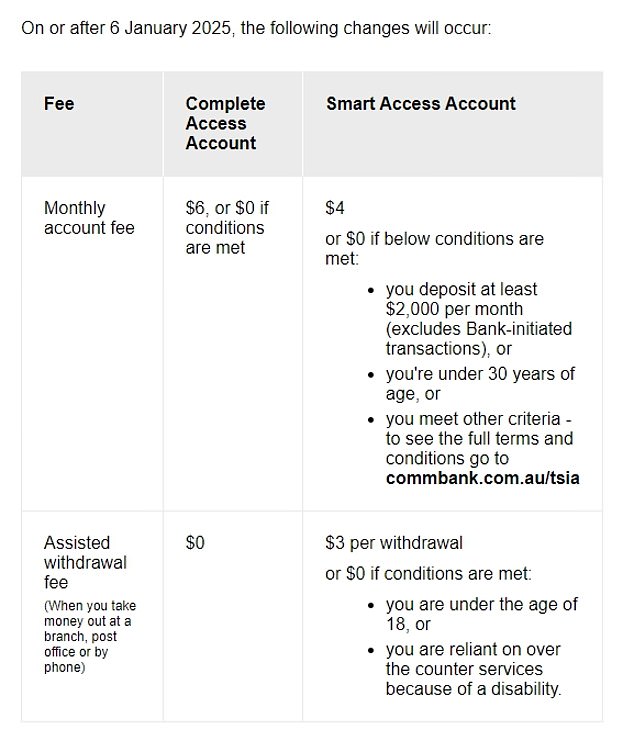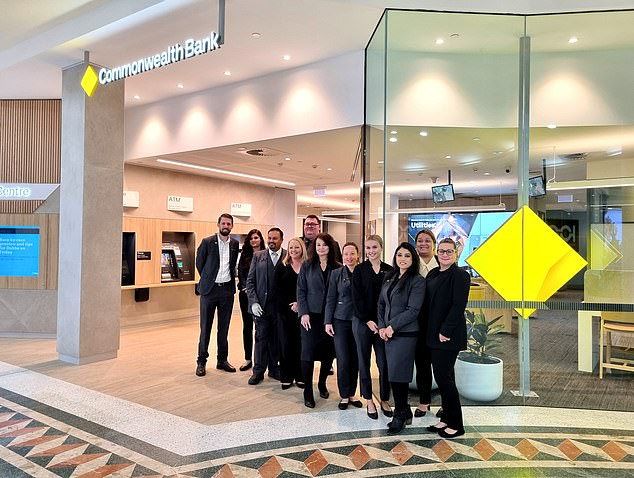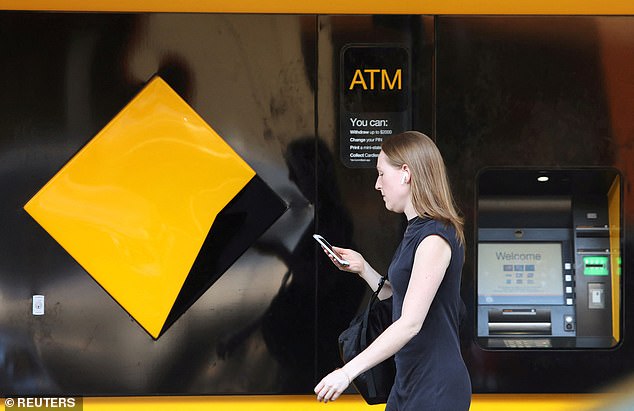Anthony Albanese’s government has urged the Commonwealth Bank to reconsider charging customers a fee if they want to withdraw their own money from branches.
Bank customers were in for a big surprise on Monday when the bank announced that it was closing its “Full Access Account” and switching it to “Smart Access Accounts.”
But the new account will include a $3 fee added to every withdrawal from a branch, post office or phone, starting Jan. 6.
Housing Minister Clare O’Neil hit out at the decision and called on the bank to reconsider.
‘It doesn’t seem fair or appropriate and this is a huge bank making huge profits. Come on, guys. It’s Christmas. We don’t need this now,” O’Neil told Nat Barr’s Sunrise show.
‘This is not something the bank should do and we are asking them to reconsider.
CommBank told Daily Mail Australia that it “continues to offer its customers free cash withdrawals from our nationwide ATM network.”
“The monthly fee for the Smart Access account is currently $2 less than the Complete Access account and both accounts offer similar features,” the spokesperson said.
Commonwealth Bank has told customers they will have to pay a fee to withdraw cash at a branch.

An email sent to customers on Monday detailing the new rate on the Smart Access account; Complete Access account type will be closed
‘Our Smart Access account has a $3 assisted withdrawal fee. This is our main trading account and the assisted withdrawal fees on that account have not changed.
‘We continue to offer waivers of assisted withdrawal fees for customers who meet certain criteria, including certain types of pension recipients, those depositing $2,000 a month and those under 18.
“Our Streamline Basic account has no monthly account fees or assisted withdrawal fees and is available to customers who hold an eligible concession card.”
In recent years, the bank has remained quiet about whether it is transitioning its branch network, as a whole, to “cashless,” and CommBank has opened a number of “Specialty Centers,” which do not have tellers to handle physical cash.
Specialist Centers focus on mortgage and commercial loan products, lines of credit and business services. Meanwhile, customers who want to deposit or withdraw cash are directed to online banking or ATMs.
When Specialist Centers started appearing in July last year, this newspaper asked if the bank was considering phasing out physical cash and received a response that seemed to dodge the question.
“Commonwealth Bank has created a very small number of specialist centers in major metropolitan areas, which are designed to support personal and business customers with more complex banking needs,” a spokesperson said at the time.
‘These specialist centers give customers face-to-face access to specialist home and business lenders, and also offer the latest self-service technologies. All of our specialist centers are located in major metropolitan locations and in close proximity to full-service branches.
“We continue to maintain Australia’s largest branch network for customers.”
In August this year, CommBank said it was costing it around $350 million a year just to hold physical cash on its network, describing it as a “challenging business model.”
However, that had little impact on CBA’s results, which made a profit of $9.5 billion after tax in the 2023/24 financial year.
CBA subsidiary Bankwest announced earlier this year that it would eliminate physical cash services and transition to a digital-only bank.
Bankwest said it would close 45 of its branches and a further 15 regional branches would become CBA locations.
Of the other big four banks, ANZ and NAB have also opened branches that do not offer counter services.
Australia’s fifth largest, Macquarie Bank, closed its face-to-face services and became a digital-only bank from November 1 this year.
In all cases, banks have said physical cash transactions represent a small fraction of their business, but concerns have been raised about the shift to digital-only currency.
These include privacy, fees incurred with tap-and-go payments and the increased risk of hacks, cyberattacks and online scams, as well as reliance on digital infrastructure that could suffer power outages.
Vulnerable people, such as people with disabilities, undocumented workers, refugees, victims of abuse and those living in remote and regional areas, are also likely to be disproportionately affected by the loss of cash.

Pictured are workers at a cashless Commonwealth Bank branch in Penrith. Deposits and withdrawals can still be made through on-site ATMs.
CBA has also removed more than 800 ATMs from its network.
‘Five years ago, 43 percent of all point-of-sale transactions were cash. Today, the figure is around 15 percent,” CEO Matt Comyn explained last year.
“And yet, every week, customers transact more than $18 billion through the CommBank app, a 64 percent increase in just two years.”
He said CommBank’s 10 million customers were paying about $40 each to finance the $400 million expense to keep physical cash in circulation at its branches.
“Many of our customers do not use cash and these customers subsidize those who do,” he said.
Earlier this year, Australia’s largest cash distribution service, Armaguard, was on the brink of collapse until it received a $50 million bailout from major banks and large retailers in late June.
Even though fewer people are using cash, the right to do so must be defended, Reserve Bank Governor Michele Bullock said.
Giving evidence to the federal parliament’s economy committee, Ms Bullock said access to cash was “a sensitive issue” as pressure grew on the banking sector and government to do without it.
“There is a minority, but a significant minority, of people who still rely heavily on cash and want to use it,” he said.
“The government is committed, and so are we, to trying to maintain access to cash for people who want to use it,” he said.
“This is not just a problem in Australia, it is a problem around the world as the use of cash for transactions declines,” Ms Bullock said.
“There are all these fixed costs of maintaining a cash distribution system, and with fewer cash transactions, that means the cost per transaction keeps going up and up; it’s becoming uneconomical.”


